Nestled in the heart of Tokyo, Asakusa’s 1400-year history unfolds like a carefully preserved scroll, offering visitors a glimpse into Japan’s ancient past. Step back in time as the cobblestone streets whisper tales of bygone eras, leading curious travelers on a path of discovery.
From the grandeur of Sensoji Temple to the bustling Nakamise-dori, each corner holds a piece of Asakusa’s legacy waiting to be unraveled. But what hidden gems lie beyond these renowned landmarks, and what untold stories linger in the shadows of this historic district?
Just The Basics
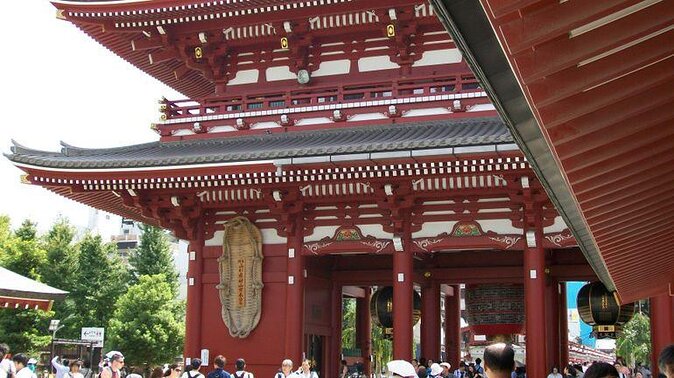
- Asakusa’s historical significance spans over 1400 years, showcasing the evolution of Japanese culture and architecture.
- Architectural marvels in Asakusa combine traditional and modern styles, seen in the intricate craftsmanship of historical buildings.
- Iconic landmarks like Sensoji Temple and Nakamise-dori reflect Asakusa’s rich history and cultural significance.
- Asakusa offers a vibrant market scene, traditional cuisine, and unique local products, providing a glimpse into its culinary heritage.
Here's some other great tours and experiences nearby we think you'll like.
Historical Significance of Asakusa
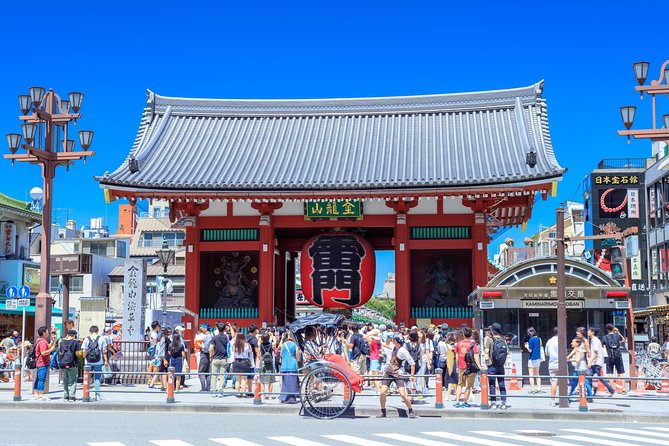
Delving into Asakusa’s rich history unveils a tapestry of cultural heritage dating back over 1400 years. The area is renowned for its architectural marvels, reflecting a blend of traditional Japanese style and modern influences. Asakusa boasts a deep-rooted connection to ancient Japan, with structures like Sensoji Temple standing as testaments to this enduring legacy. Visitors can witness the intricate craftsmanship of these historical buildings, each telling a unique story of the past.
Exploring Asakusa provides a glimpse into the evolution of Japanese culture and architecture over centuries, offering a captivating experience for history enthusiasts. The cultural heritage preserved in Asakusa’s architectural gems serves as a window into Japan’s vibrant past, making it a must-visit destination for those seeking to enjoy the country’s rich history.
Iconic Landmarks and Temples
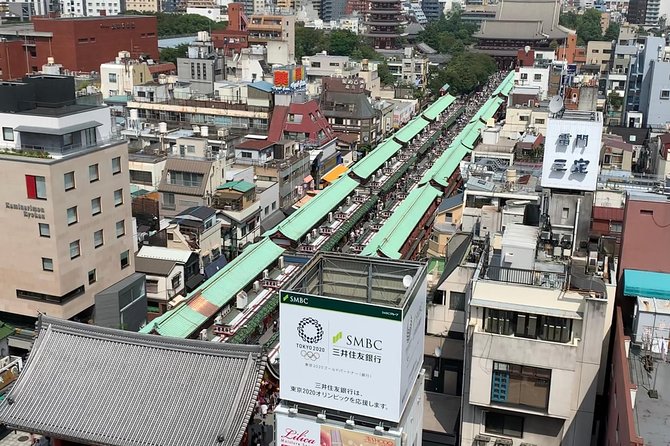
One can discover the allure of Asakusa through its iconic landmarks and temples that showcase a harmonious blend of tradition and modernity. Sensoji Temple, one of Tokyo’s most renowned temples, stands as a symbol of Asakusa’s rich history.
Visitors can stroll down Nakamise-dori, a vibrant shopping street leading to the temple, lined with traditional stalls offering local snacks and souvenirs. The striking architecture of Sensoji Temple, with its iconic Thunder Gate (Kaminarimon) and five-story pagoda, provides a glimpse into Japan’s spiritual heritage.
Exploring these historic sites offers a fascinating insight into Asakusa’s cultural significance, making it a must-visit destination for those seeking a mix of ancient traditions and contemporary experiences.
Culinary Delights in Asakusa
Discover the mouth-watering array of traditional Japanese cuisine and street food offerings that tantalize the taste buds of visitors exploring Asakusa’s vibrant culinary scene.
Asakusa is renowned for its rich culinary heritage, offering a diverse range of Japanese cuisine from savory delights like tempura and okonomiyaki to delightful traditional sweets such as taiyaki and melonpan.
Travelers can enjoy the bustling food stalls along Nakamise-dori, savoring freshly made treats like imagawayaki and ningyo-yaki. The area is also famous for its matcha-flavored desserts and savory snacks like senbei rice crackers.
Whether sampling red bean paste-filled pastries or trying out savory skewers, Asakusa’s culinary offerings are sure to delight visitors seeking an authentic taste of Japanese gastronomy.
Exploring the Vibrant Market Scene
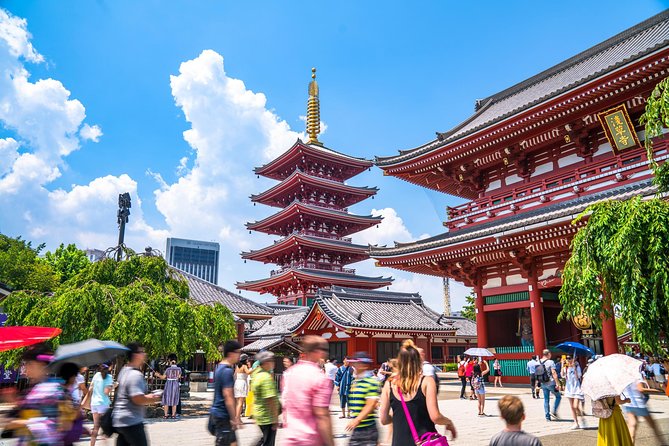
The vibrant market scene in Asakusa offers a diverse array of traditional goods and local products for visitors to explore and experience. Market culture thrives in this bustling area, where visitors can enjoy the vibrant atmosphere and interact with local vendors.
The market is a treasure trove of local delicacies, ranging from savory street food to sweet treats that showcase the rich culinary heritage of Asakusa. Visitors can sample an array of flavors unique to the region and take home edible souvenirs that capture the essence of the area.
Exploring the vibrant market scene is a budget-friendly way to experience the authentic charm of Asakusa and indulge in its culinary delights.
Recommendations for Shopping and Dining
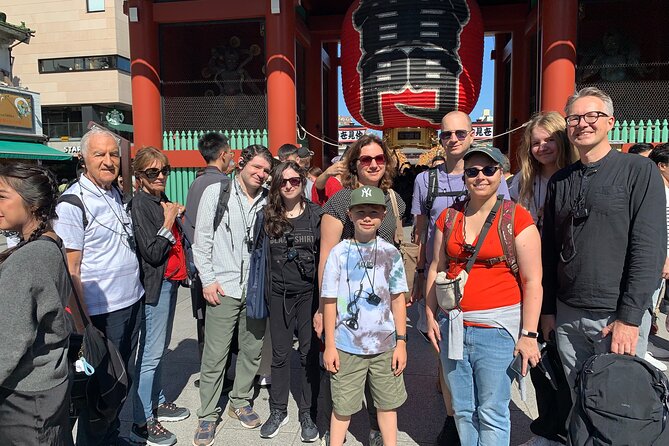
For shopping and dining in Asakusa, visitors can explore a variety of budget-friendly options that showcase the area’s culinary and retail diversity. When looking to indulge in local delicacies or pick up unique souvenirs, consider the following recommendations:
-
Shopping Tips:
-
Visit Nakamise Shopping Street for traditional snacks and gifts.
-
Explore Shin-Nakamise Shopping Street for trendy fashion items.
-
Local Delicacies:
-
Try the famous melon pan at Kagetsudo Bakery.
-
Sample Ningyo-yaki, a doll-shaped cake, from Asakusa Yoshihara.
These options provide a taste of Asakusa’s rich culinary heritage and vibrant shopping scene, all while being mindful of your budget.
Cultural Fusion in Rokku District
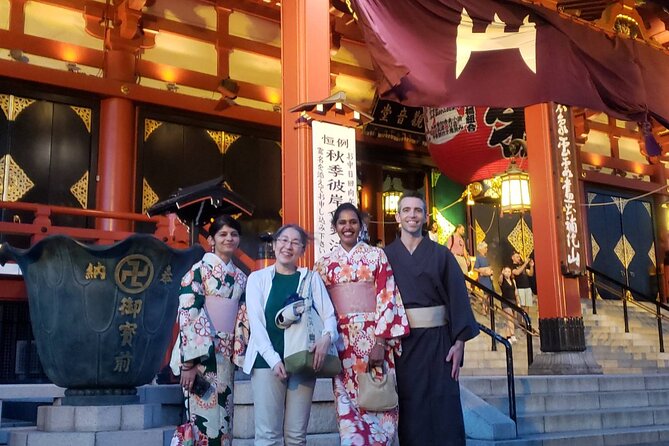
In the vibrant Rokku District of Asakusa, cultural influences converge to create a dynamic fusion of tradition and modernity. This fusion is evident in the district’s architecture, entertainment, and culinary offerings. The district seamlessly blends Japanese tradition with contemporary elements, offering visitors a unique and immersive experience. Here is a snapshot of the Japanese fusion and modern traditions you can explore in Rokku:
| Cultural Fusion in Rokku District | |
|---|---|
| 1. Traditional Japanese Theaters | 3. Modern Cafes |
| 2. Historic Temples | 4. Art Galleries |
Enjoy the rich tapestry of Rokku District, where the past meets the present in a harmonious blend of old and new.
Tips for an Enriching Experience
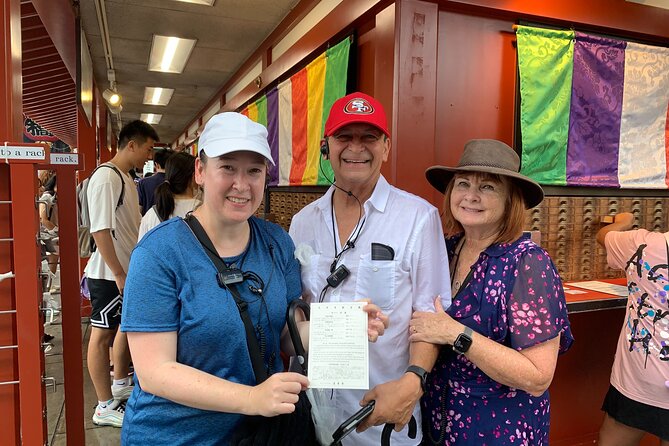
Explore Rokku District’s unique blend of traditional Japanese theaters, historic temples, modern cafes, and art galleries to enhance your Asakusa experience. To make the most of your visit, consider the following engagement strategies and embrace local traditions:
-
Engage with Local Performers: Attend a traditional kabuki or rakugo performance for a taste of authentic Japanese theater.
-
Join a Tea Ceremony: Enjoy the serene atmosphere of a tea ceremony to appreciate local customs and rituals.
-
Visit Sensoji Temple: Participate in the temple’s cleansing ritual by burning incense and purifying yourself before exploring its historic grounds.
-
Try Local Street Food: Sample regional delicacies like ningyo-yaki (doll-shaped cakes) or dorayaki (red bean pancakes) to savor the flavors of Asakusa.
Frequently Asked Questions
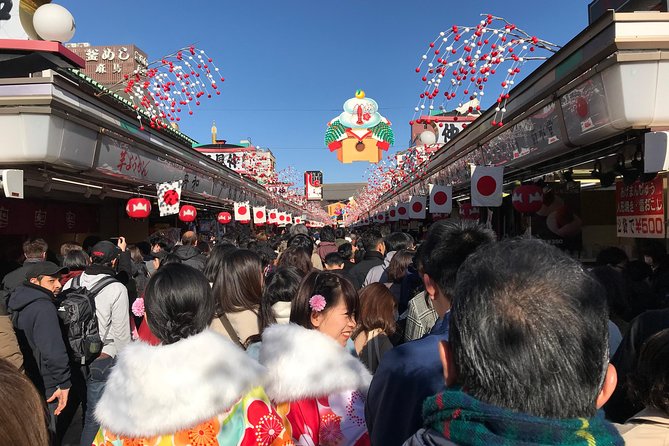
Is There a Specific Dress Code or Attire Recommended for the Asakusa Walking Tour?
For the Asakusa walking tour, there is no specific dress code, but wearing comfortable shoes is recommended. Travelers should dress in casual, comfortable attire suitable for walking and standing to fully enjoy the experience.
Are There Any Restrictions or Guidelines to Keep in Mind When Visiting Sensoji Temple?
When visiting Sensoji Temple, travelers should observe cultural etiquette by bowing respectfully, refraining from loud behavior, and removing shoes before entering. Follow photography rules, avoid flash, and be mindful of gift shop etiquette.
What Is the Best Time of Day to Experience the Bustling Market Street in Asakusa?
The best time to experience the bustling market street in Asakusa is in the morning. Visitors can soak up the vibrant energy, sample local treats, and explore the charming stalls. It’s a budget-friendly way to start the day.
Are There Any Special Events or Festivals That Visitors Should Look Out for in Asakusa?
Visitors to Asakusa should keep an eye out for special events like local cuisine festivals and traditional performances. These experiences offer a taste of authentic Japanese culture and are a must-see for those exploring the area.
How Can Visitors Navigate the Rokku District Efficiently to Make the Most of Their Shopping and Dining Experience?
To navigate the Rokku district efficiently for shopping and dining, visitors should explore hidden gems, food stalls, street performances, and local crafts. Engage with the local guide for insights and enjoy a budget-friendly experience.
Final Words
Explore the captivating history and vibrant culture of Asakusa on this immersive walking tour. With a knowledgeable guide leading the way, visitors can explore the iconic landmarks, savory street snacks, and bustling market scene of this historic district.
Discover the fusion of tradition and modernity in Rokku district and gain valuable recommendations for dining and shopping. Embark on this budget-friendly journey to uncover the secrets of Asakusa’s past and present.
